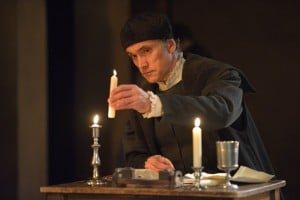 Thank you so much to Marcia Wadham for writing this wonderful review of the RSC’s adaptations of Hilary Mantel’s novels Wolf Hall and Bring Up the Bodies…
Thank you so much to Marcia Wadham for writing this wonderful review of the RSC’s adaptations of Hilary Mantel’s novels Wolf Hall and Bring Up the Bodies…
Hilary Mantel’s books are wonderfully brought to life in these stage plays from the RSC. It was hard to imagine how each book, with around 800 pages of well-crafted prose, could be condensed into three hours, but the results are mesmerising. The set is simple, the scene changes are slick, the choreography is breath-taking and the comic timing is perfect. As a piece of theatre, it is stunning.
My favourite aspect of Hilary Mantel’s books is her characterisation of Thomas Cromwell; hers is not a history of goodies and baddies, but of a complex, intelligent, flawed individual. Ben Miles’ portrayal brings this out perfectly. Although you are led to have a certain sympathy for him, you definitely cannot like him very much. Ordinarily, I have an intense dislike of individual actors making solo curtain calls, but in this case it seemed wholly appropriate, as Miles never left the stage and led the action flawlessly in every scene.
Even more than in the books, you have the sense throughout the plays that you are seeing history through the eyes of one of its protagonists. All of the characters are introduced according to the roles they play in the life of Thomas Cromwell – people who will one day be out to use his considerable abilities and influence with the King to get what they want, and the next will readily use their own power to attempt to bring him down. His own loyalties, of course, lie always in the place where they will give him the greatest advantage.
I suspect that this would be difficult to follow for those who have limited knowledge of English history. Listening in to conversations in the intervals, I heard a number of people trying to explain some of the veiled references to the impact of events on both the monarchy and the church in England, especially of the pointed references to the birth of the ‘useless’ Princess Elizabeth.
Any avid Tudor history fan should watch with caution, though. These are plays based upon works of historical fiction, and are not aiming to be documentaries. The general sense of the time in which these events took place is conveyed beautifully – the intrigue, the pace of change, the rapid shifts in power, the danger of being out of favour and the King’s need for a son. But the detail is entirely from the imagination.
Henry’s wives are presented almost as caricatures of themselves; Katherine is fiercely loyal and angry, Anne is feisty and tempestuous, Jane is demure and naïve. To the history purist, this will be a huge frustration, but it adds to the realisation that you are watching through an imagining of Cromwell’s viewpoint, of the roles they play as pawns standing in his way to power. And it makes for a great theatre and great entertainment, which manages to keep the audience captivated for almost six hours.
You can find out more about the RSC’s plays of Wolf Hall and Bring Up the Bodies, and buy tickets, at http://www.rsc.org.uk/whats-on/london/
Photo: Ben Miles as Thomas Cromwell, by Keith Pattison, courtesy of RSC.